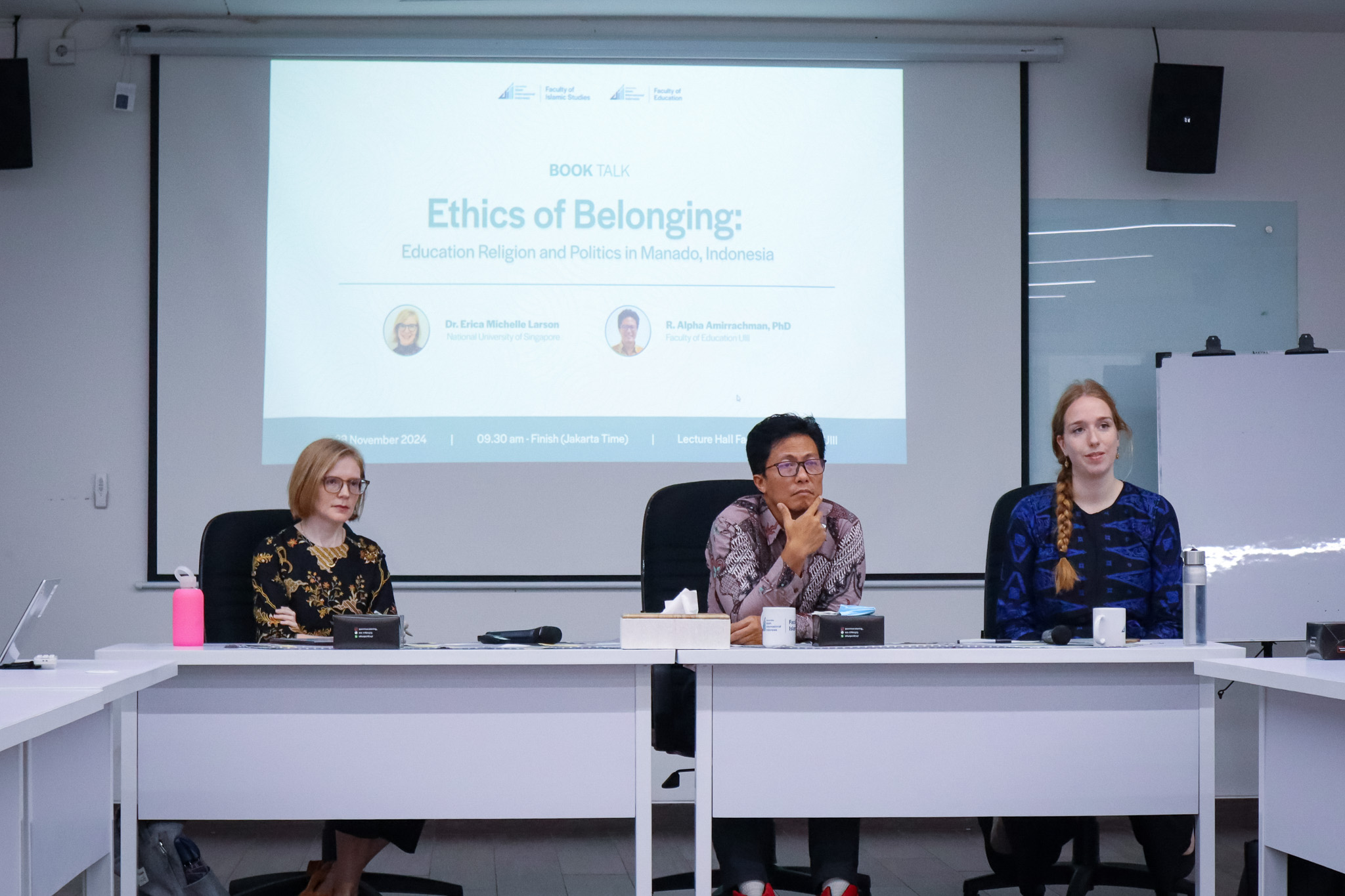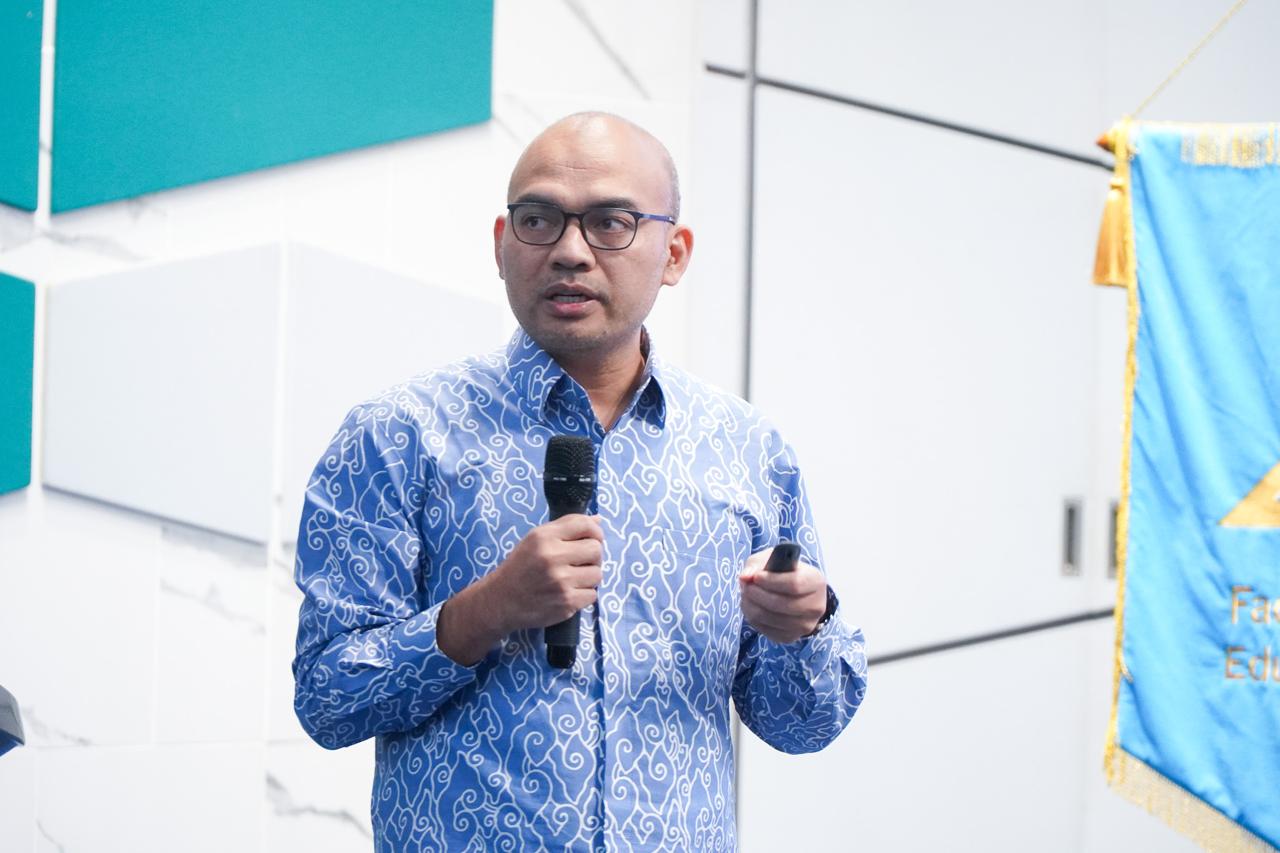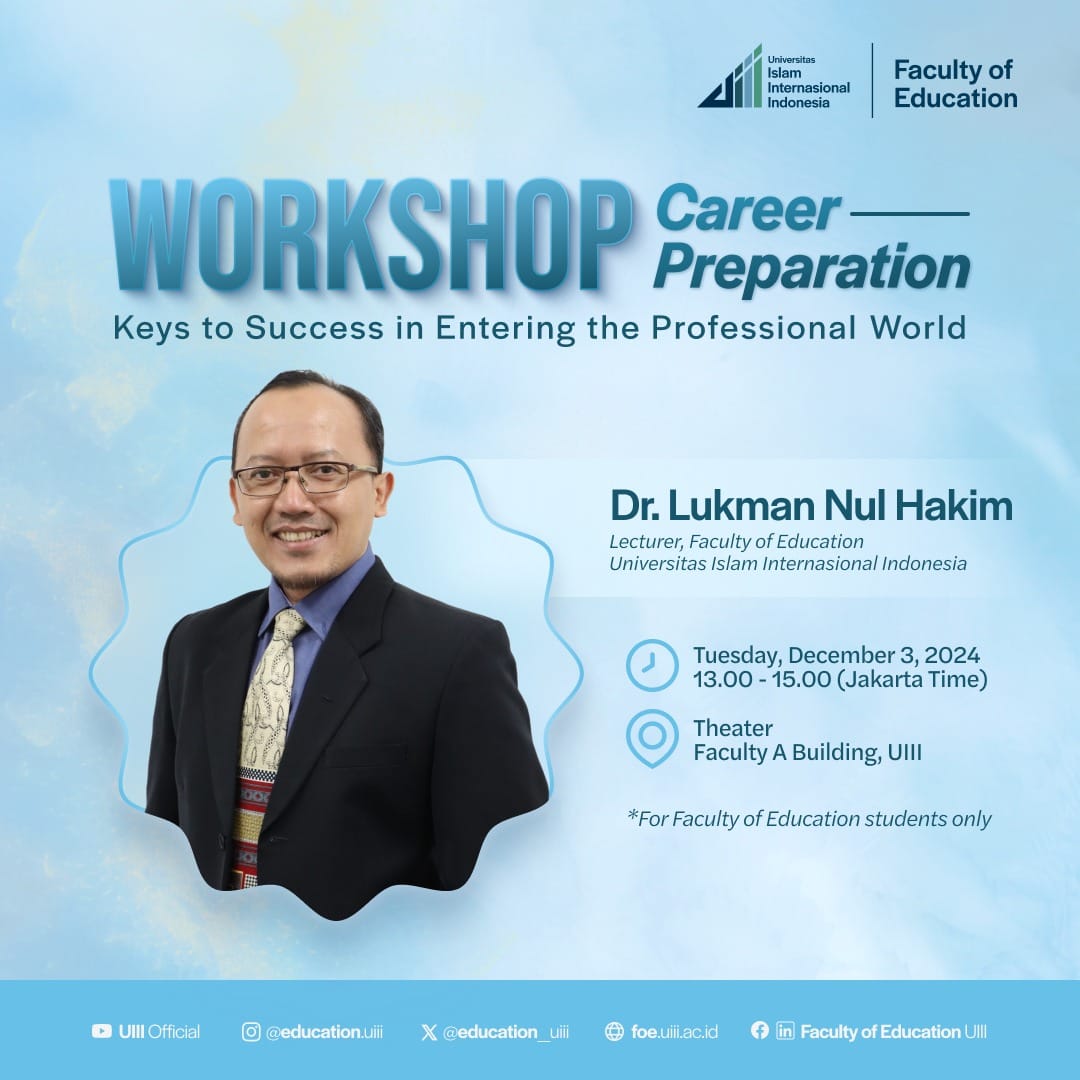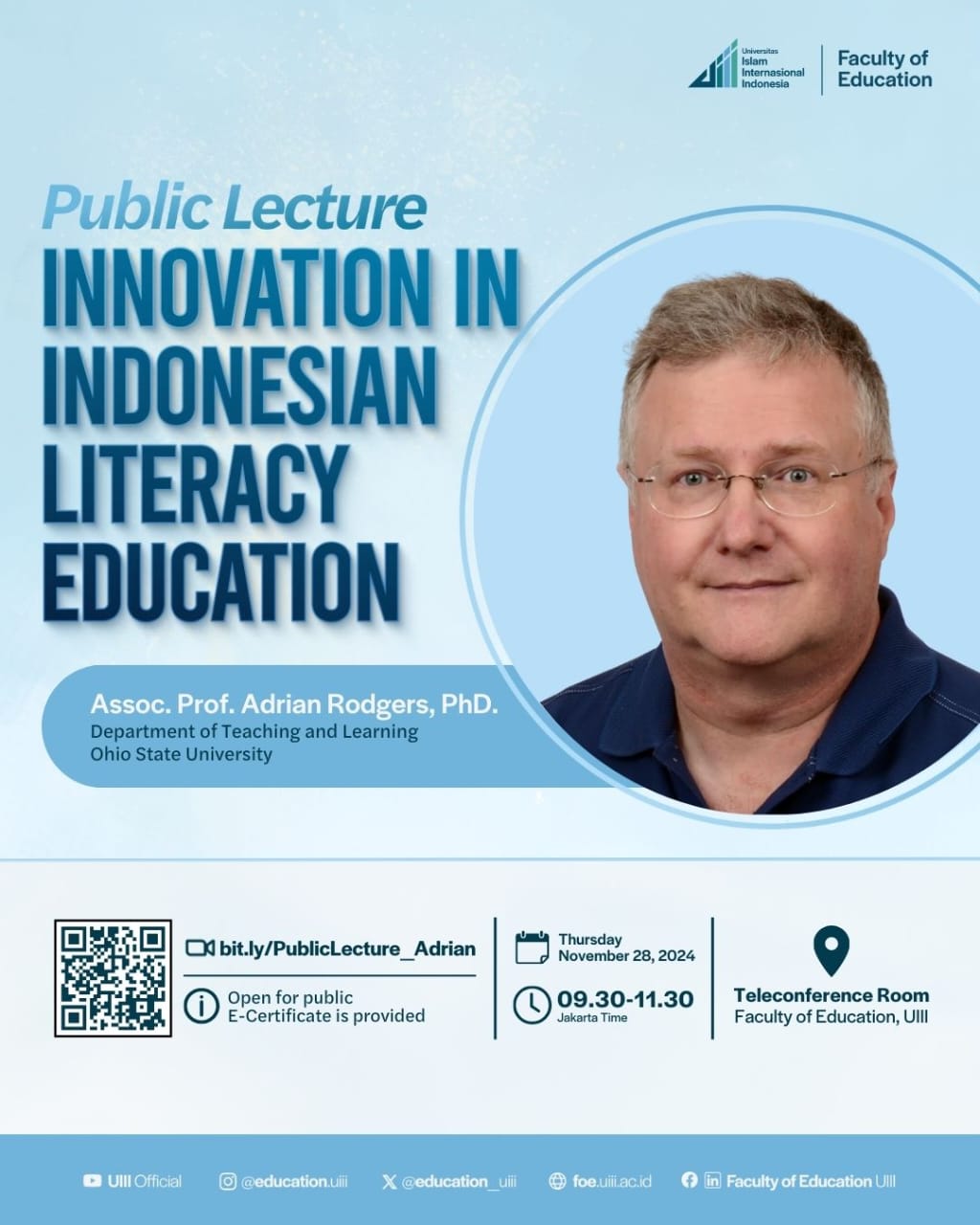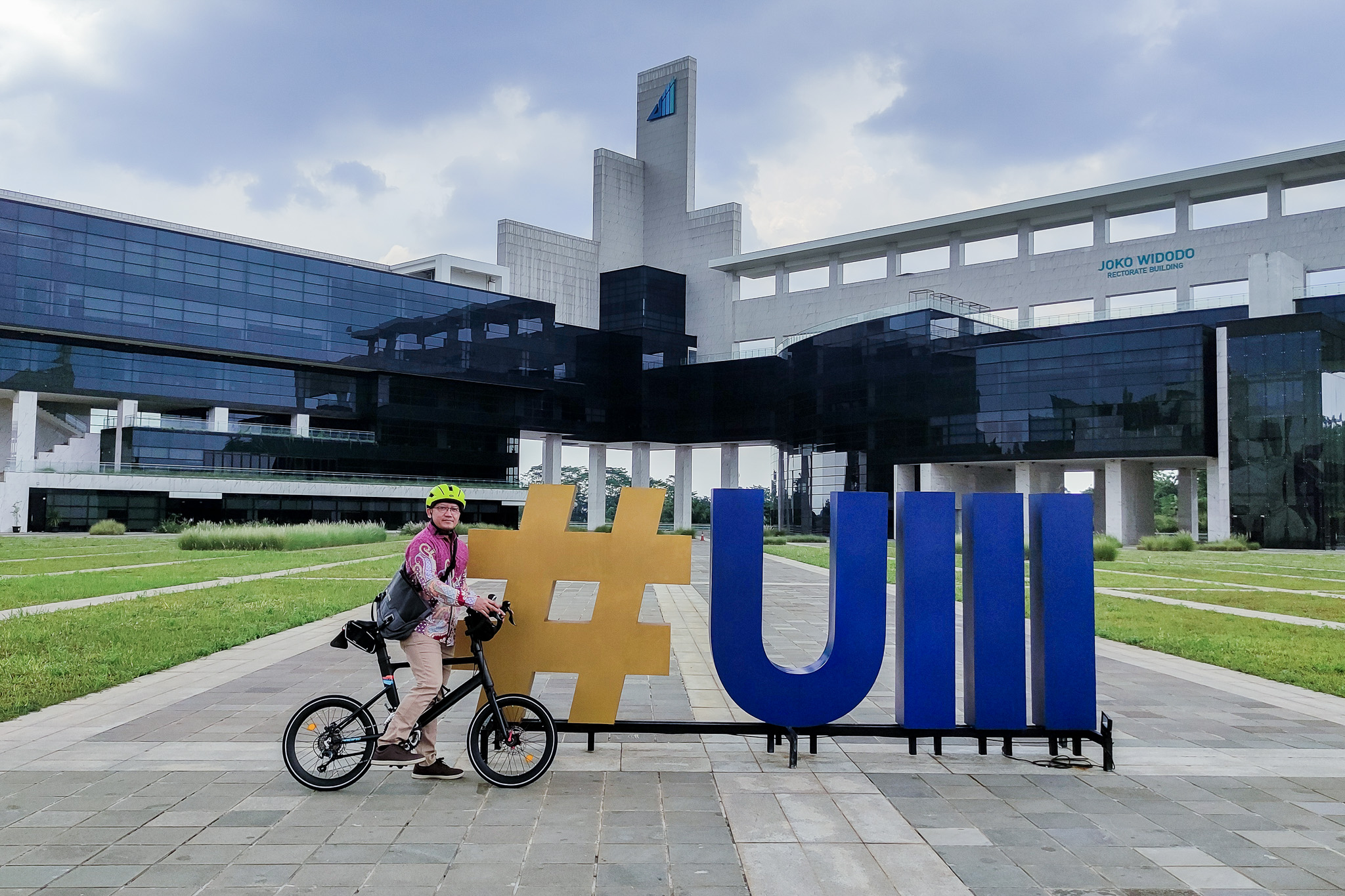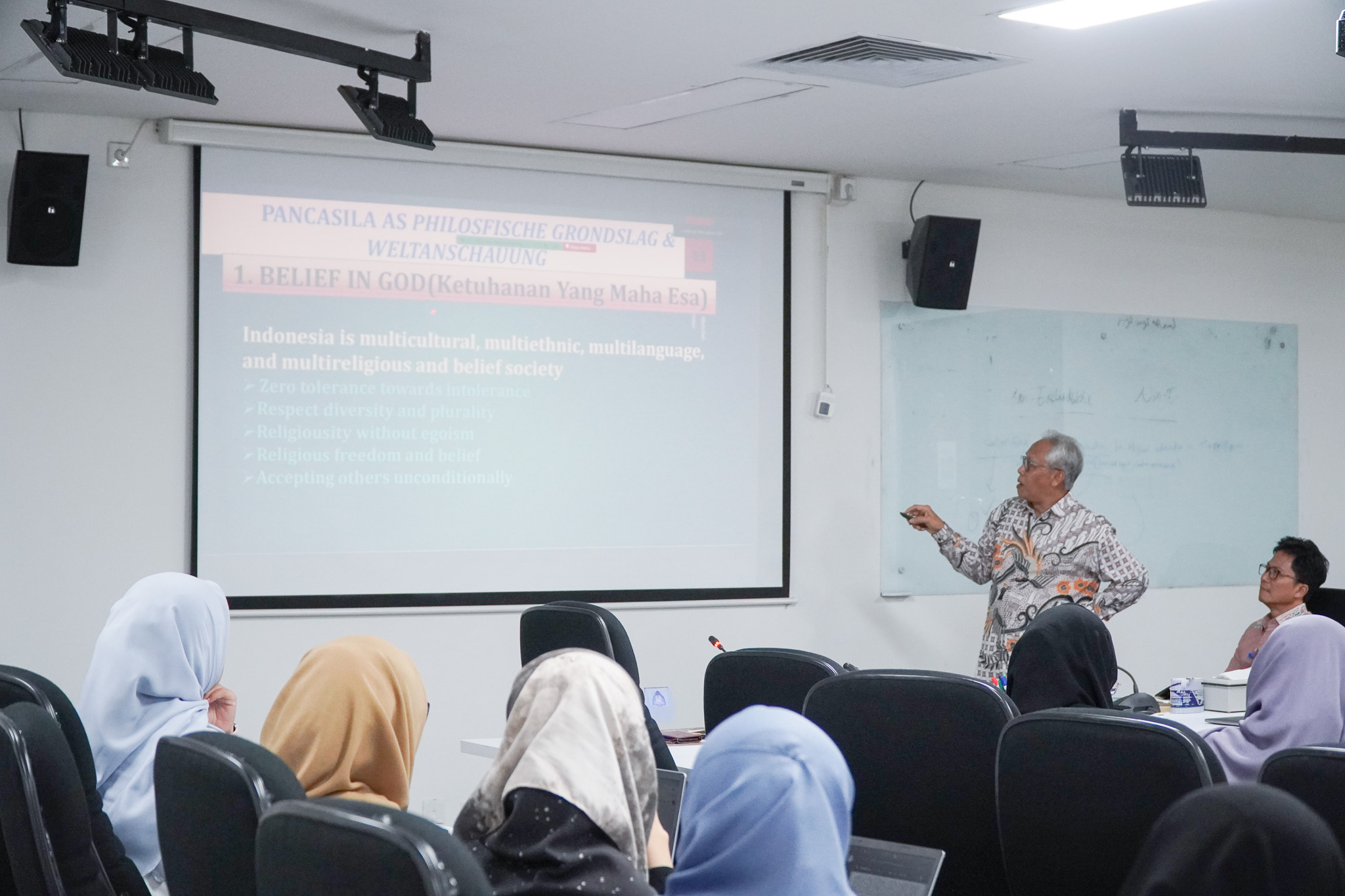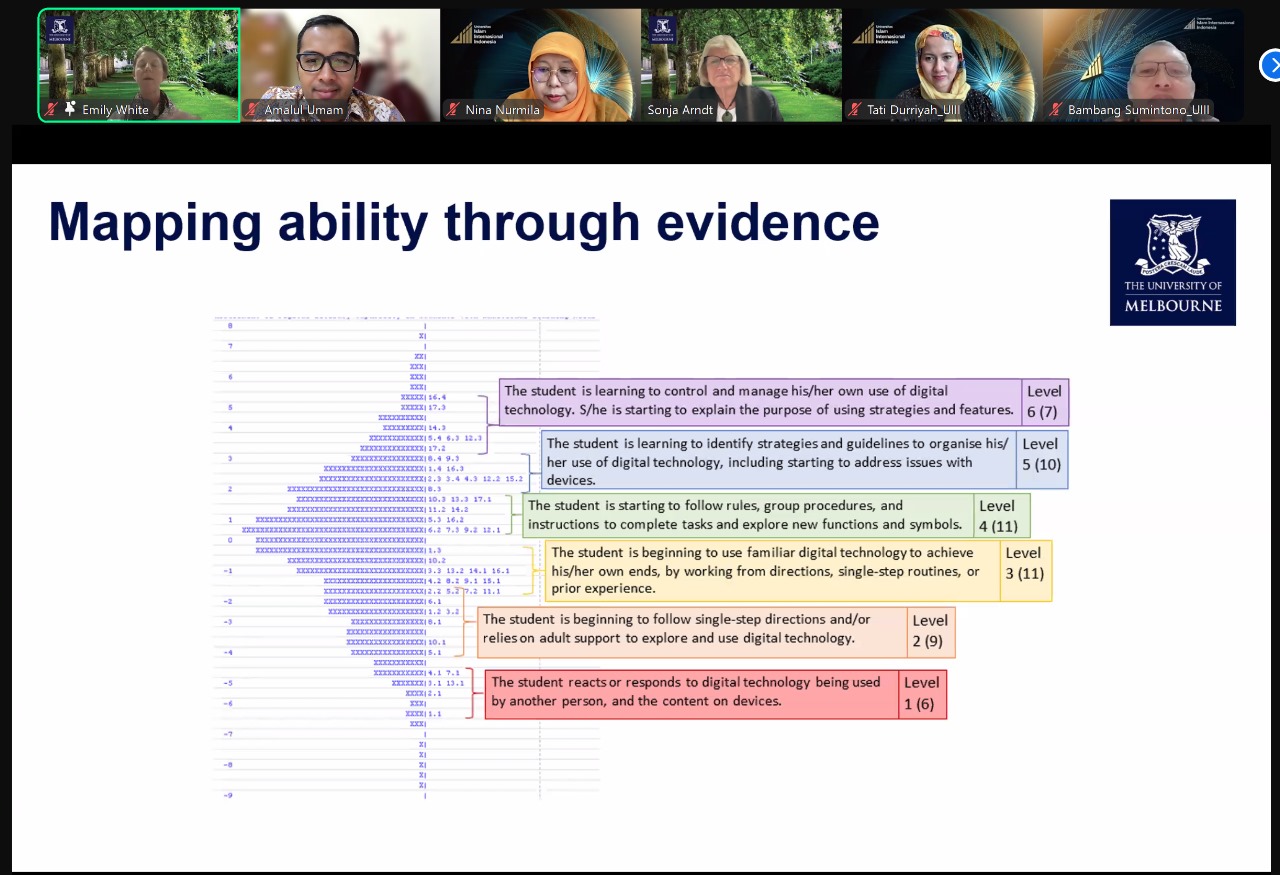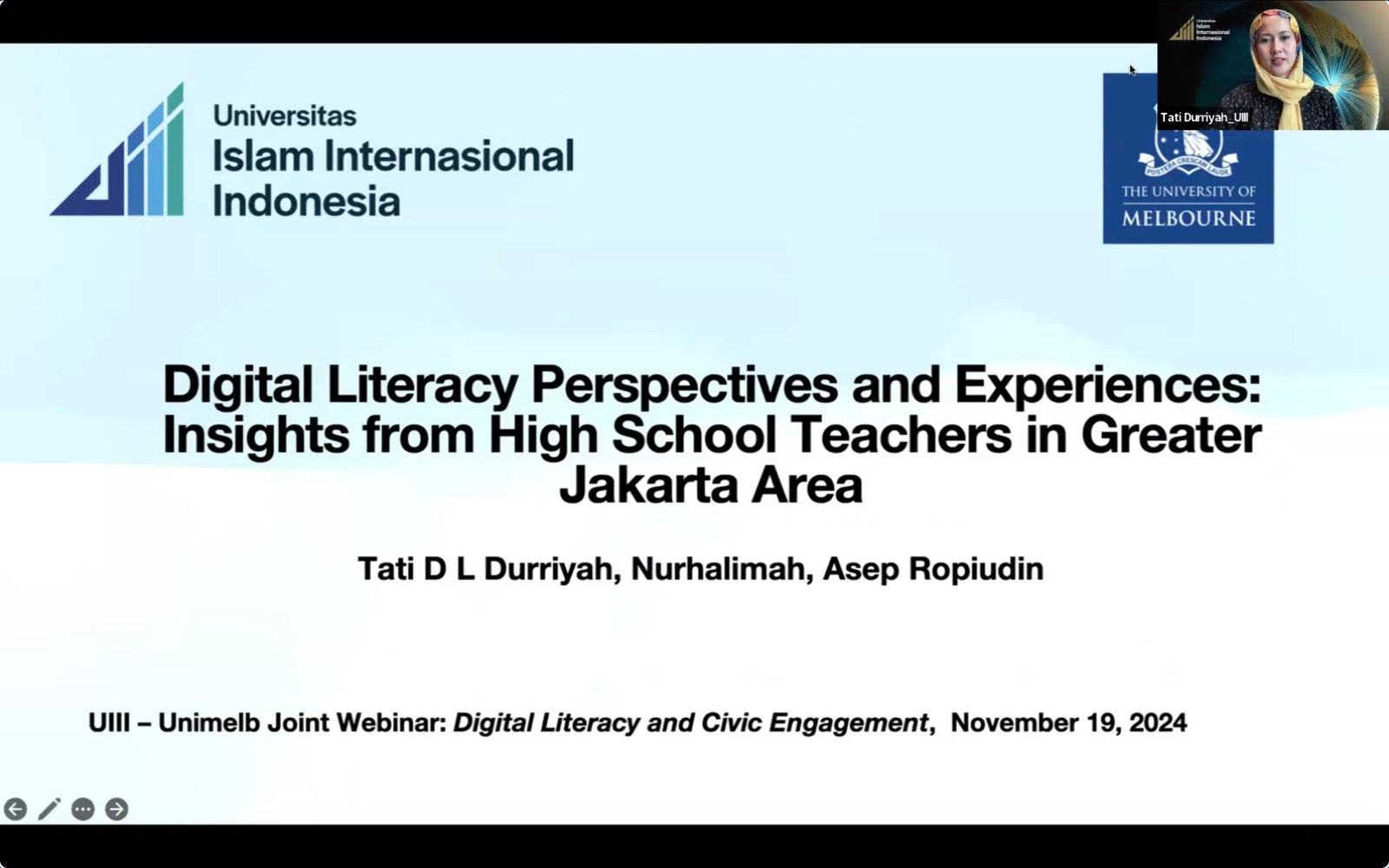UIII Hosts Insightful Book Talk on ‘Ethics of Belonging’

UIII Hosts Insightful Book Talk on ‘Ethics of Belonging’
December 03, 2024
Contributor: Supriyono | Editor: Dadi Darmadi | Photo: Dzakiyyah Fauziyah Rif’at
On November 28, 2024, the Faculty of Islamic Studies at UIII organized a compelling Book Talk featuring Erica M. Larson, Ph.D, from the National University of Singapore. Dr. Larson, an expert in religion, education, and politics, presented her groundbreaking work, “Ethics of Belonging: Education, Religion, and Politics in Manado, Indonesia”, published by the University of Hawai'i Press in 2024. The event was enriched by R. Alpha Amirrachman, Ph.D., a lecturer at UIII's Faculty of Education, who served as the discussant. UIII’s research fellow Wietske Merison, MA from the University of California, Los Angeles (UCLA) acted as a moderator.
The event shed light on the pluralistic dynamics of Manado, a city in North Sulawesi recognized for its religious harmony and tolerance. With a diverse demographic comprising 61% Protestant, 33% Muslim, and 4% Catholic populations, Manado has been lauded as Indonesia’s “most tolerant city” by the Setara Institute in 2017.
In her talk, Dr. Larson explored how education acts as a medium for fostering discussions about religious and ethnic diversity. She illustrated this through case studies of three schools in Manado: a public high school (SMA Negeri), a private Catholic school (Lokon), and a public Islamic madrasah (MAN). These institutions, she argued, serve as “sites of deliberation” where ethical frameworks of coexistence are both channeled and contested.
“Why schools?” she asked. “It’s because schools as sites of deliberation about difference and belonging in the nation.” Education, she explained, is both disciplinary and deliberative, offering a unique space to navigate complex questions about belonging and identity.
Furthermore, Dr. Larson highlighted the local ethos of Torang Samua Basudara (We are all brothers), which underscores harmony as a cornerstone of the region's identity. She also pointed out the nuances in Manado's pluralism. While aspirational coexistence celebrates mutual recognition and religious freedom, majoritarian coexistence relies on the goodwill of the dominant Christian population. “Hence, coexistence is understood as threatened only by the outsiders,” she said.
She cited an example of the building of religious theme park in the city that was forced to stop because of ‘religious’ dispute involving local adat organizations, which tended to identify local Minahasan cultural identity more with Christian identity.
Education and equity expert Dr. Alpha Amirrachman applauded the book as a significant contribution to understanding the dynamic and tension in an ongoing political and cultural project of Indonesia. “Dr. Larson was successful in revealing ‘what is behind the curtain’ with her astonishing anthropological work in Manado,” he said, further saying that the book should be understood against the backdrop of adat or local tradition revival during reformasi era where democratization and ‘big-bang’ decentralization swept the country.
“This big-bang decentralization saw an increase of what seemed to be an exclusive identity politics at the local level. After the fall of Suharto, the country saw the revival of the authority of adat, often seen as an alternative to the corrupt practices of the New Order regime,” said Dr. Amirrachman.
He cited the work of Davidson and Henley who wrote specifically about the revival of local tradition in Indonesia. Also, he compared Dr. Larson’s work with his own previous work in Indonesia’s province of Maluku, which had been devastated by religious conflict.“
I also saw the revival of local tradition problematic since there are always groups of people whose tradition is not always the same as that of indigenous people. This will push for the emergence of local identity politics, and one may ask: who does belong to such a group and who is perceived as an outsider?” he said, adding that it is important to extract “shared values” of any tradition or wisdom as to ensure that every group of society voluntarily embrace them.
Dr. Amirrachman said it is also critical to see the economic, not only religious factor as various factors might have been intertwined. Dr. Larson responded that fact that the poverty rate was relatively low might have contributed to the immunity of Manado from religious conflict from neighboring regions.
The Book Talk event reflects UIII’s dedication to fostering academic discussions on critical issues at the intersection of religion, education, and society. Dr. Erica Larson’s insightful ethnographic work of Manado’s challenges in dealing with pluralism provided valuable perspectives on the possibilities of coexistence in Indonesia’s richly diverse context.
source: https://uiii.ac.id/events/read/57769/uiii-hosts-insightful-book-talk-on-ethics-of-belonging
Time for Decentering Islamic Education to Indonesia

Time for Decentering Islamic Education to Indonesia
December 04, 2024
Contributor: Supriyono | Editor: Dadi Darmadi | Photo: Virda Lalitya Umam
Depok, November 26, 2024 – The UIII Faculty of Education hosted a thought-provoking LunchTalk #35 series featuring Andar Nubowo, Ph.D, a distinguished lecturer at the faculty and executive director of Ma’arif Institute. His presentation, delved into the socio-historical dynamics of Islamic education and proposed a compelling vision for “decentering Islamic education” toward Indonesia.
Dr. Nubowo’s presentation began with the historical transmission of Islamic knowledge from the Middle East to Southeast Asia, particularly Indonesia. Historically, Mecca, Medina, and Cairo have served as the epicenters of Islamic learning since the 17th century, attracting Indonesian students (commonly referred to as Jawi Muslims) who later returned to Nusantara to disseminate their knowledge.
While this relationship enriched Indonesian Islamic education, it also led to a “center-periphery” dynamic, where the Middle East was perceived as the authoritative center, while Indonesia holds a peripheral role. This hierarchy often dismissed Indonesian contributions as heterodox or syncretic. “The intellectual legacy of Indonesian Muslims, despite its richness and diversity, has historically been overshadowed by an Arab-centric vision of Islam,” Dr. Nubowo noted.
Hence, he advocated for a shift in this narrative through what he termed the “decentering of Islamic education.” This approach recognizes Indonesia not merely as a recipient of Islamic knowledge but as a dynamic contributor to the global discourse. He highlighted how Indonesian scholars, institutions, and traditions can serve as a model for modern, pluralistic Islamic education. Initiatives such as establishing international Islamic universities and schools in Indonesia, which integrate both traditional Islamic studies and contemporary global perspectives, are key to this vision.
 Indonesia, he said, has already begun this process through reformist movements and modern Islamic educational institutions. Dr. Nubowo discussed the early 20th-century rise of reformist organizations like Muhammadiyah and Nahdlatul Ulama, which blended classical Islamic teachings with modern sciences. These movements laid the groundwork for Indonesia to claim its place as a progressive hub for Islamic education.
Indonesia, he said, has already begun this process through reformist movements and modern Islamic educational institutions. Dr. Nubowo discussed the early 20th-century rise of reformist organizations like Muhammadiyah and Nahdlatul Ulama, which blended classical Islamic teachings with modern sciences. These movements laid the groundwork for Indonesia to claim its place as a progressive hub for Islamic education.
“Since 2000s, the two guardians of Indonesian moderate Islam (Muhammadiyah and NU) have established networks of ambassadors of Indonesian Islam in Europe, Africa, Asia, America, and Australia,” he said, adding that the government’s initiative to establish UIII—arguably the first international Islamic university in Indonesia—also serves as the evidence for this development.
In conclusion, Dr. Andar called for a renewed awareness among Indonesian Muslim leaders, scholars, and policymakers to embrace the “decentering” project. “In that sense, we should consider this global initiative and consciousness in advancing knowledge, sciences, and technology, invaluable for the betterment of global society,” he said.
The lunch talk sparked engaging discussions among attendees, who reflected on how UIII and other institutions could champion this paradigm shift. By positioning itself as a leader in Islamic education, Indonesia has the potential to reshape the global Islamic intellectual landscape, moving beyond the confines of the traditional center-periphery model.This event underscores UIII’s commitment to fostering critical discussions and leading initiatives that redefine the future of Islamic education in Indonesia and beyond.
soource: https://www.uiii.ac.id/perspectives/read/57772/time-for-decentering-islamic-education-to-indonesia
Career Preparation: Keys to Success in Entering the Professional World

Dear students,
We are pleased to inform you that the Faculty of Education organizes a workshop with Dr. Lukman Nul Hakim with the topic "Career Preparation: Keys to Success in Entering the Professional World".
Join us for an insightful and interactive Career Development Workshop designed to help you gain the skills and knowledge to succeed in today’s competitive job market. Whether you're just starting your career or looking to make a change, this workshop will provide valuable tools to help you grow professionally.
Day/Date: Tuesday/ December 3, 2024
Time: 13.00-15.00 (Jakarta Time)
Place: Theater A, Faculty A UIII
Don’t miss this opportunity to invest in your career and future!
Intolerance of Uncertainty Predicts Happiness of Young Adults in Post COVID-19 Pandemic
 Sriyanto, A.S., Hakim, L.N. Intolerance of Uncertainty Predicts Happiness of Young Adults in Post COVID-19 Pandemic. Biopsikososial: Jurnal Ilmiah Psikologi Fakultas Psikologi Universitas Mercubuana Jakarta, v. 8, n. 2, p. 95-104, oct. 2024. ISSN 2598-4918. Available at: https://publikasi.mercubuana.ac.id/index.php/biopsikososial/article/view/30945/8969. doi: http://dx.doi.org/10.22441/biopsikososial.v8i2.30945.
Sriyanto, A.S., Hakim, L.N. Intolerance of Uncertainty Predicts Happiness of Young Adults in Post COVID-19 Pandemic. Biopsikososial: Jurnal Ilmiah Psikologi Fakultas Psikologi Universitas Mercubuana Jakarta, v. 8, n. 2, p. 95-104, oct. 2024. ISSN 2598-4918. Available at: https://publikasi.mercubuana.ac.id/index.php/biopsikososial/article/view/30945/8969. doi: http://dx.doi.org/10.22441/biopsikososial.v8i2.30945.
Debunking disinformation on YouTube: a fact check on the 2024 Indonesian election
 Alamsyah, P., Hakim, L. N., Wijaya, G., & Wicaksono, A. (2024). Debunking disinformation on YouTube: a fact check on the 2024 Indonesian election. Jurnal Studi Komunikasi, 8(3), 547 – 560. https://doi.org/10.25139/jsk.v8i3.8348
Alamsyah, P., Hakim, L. N., Wijaya, G., & Wicaksono, A. (2024). Debunking disinformation on YouTube: a fact check on the 2024 Indonesian election. Jurnal Studi Komunikasi, 8(3), 547 – 560. https://doi.org/10.25139/jsk.v8i3.8348
Public Lecture: Innovation in Indonesian Literacy education

We are pleased to inform you that the Faculty of Education organizes a public lecture with A/Prof. Adrian Rodgers from Ohio State University, with the topic "Innovation in Indonesian Literacy education.”
Innovations in literacy education are transforming how students acquire critical reading and writing skills. At the same time, integrating technology which can personalize instruction, catering to diverse learner needs. Multimodal approaches incorporate visuals, audio, and hands-on activities, fostering deeper understanding for learners with varied preferences. However, literacy gaps can happen which affect students' learning performance.
In this public lecture, Dr. Adrian Rodgers uses pictures of Indonesian classrooms year 1-3 to consider why students are not performing as highly as they could and what teachers can do to change that.
Day/Date: Thursday/November 28, 2024
Time: 09.30-11.30 (Jakarta Time)
Place: Teleconference, Faculty A
Online participation
https://bit.ly/PublicLecture_Adrian
Recorded on YouTube
https://www.youtube.com/watch?v=soMlclRj46Q
Pedaling to Work, Dr. Lukman’s Message on ‘World Sustainable Transport Day’
Pedaling to Work, Dr. Lukman’s Message on ‘World Sustainable Transport Day’
November 26, 2024
Contributor: Supriyono | Editor: Dadi Darmadi | Photo: Fransiska Aprilya Lowarmodo
Like much of Greater Jakarta area, Depok—a city where UIII is located—is known for its traffic jams, especially during rush hours on weekday’s mornings. The sound of car horns and motorbike engines fills the air as people try to navigate the crowded streets to go to office. But while most are stuck in this daily chaos, Dr. Lukman Nul Hakim has chosen a different way to get to work—one that is quiet, healthy, and better for our planet.
Dr. Lukman, a psychologist and lecturer at UIII Faculty of Education, chooses to ride his bike to UIII campus. This, he said, is not just about avoiding traffic. Cycling, for him, has become a way of life. “Cycling makes me happy. It gives me energy, clears my mind, and helps me feel at peace,” he testified.
His love for cycling is not limited to his commute. One of his most special memories is a bike trip from Depok to Yogyakarta with his wife. Riding a tandem bike, they pedaled over 500 kilometers together in six days. “It was our romantic journey,” he said. “My wife and I wanted to create memories we’d never forget and celebrate our time together.” Dr. Lukman documented their sweet and inspiring journey on his YouTube Channel.
At home, Dr. Lukman is also part of a community which campaign for “Gowes Nuju Kantor” (Pedaling to Work). The story goes back to when he was working at the House of Representatives (DPR RI) in Central Jakarta. He started biking to go to office, and to his surprise, the others joined him. What began as a small group grew into a club called the ‘Parle Cycling Community’, with members from different departments, including parliamentarians. “Change starts with us,” he recalled. “When people see us cycling, they start to wonder if they can do it too. That’s how it all begins.”

Hence, as today (November 26) marks the ‘World Sustainable Transport Day’, Dr. Lukman wants to seize the moment to convey a simple message for all of us: “Try biking, walking, or taking public transport, even if it is just once a week,” he said. “It is a small change that makes a big difference. It is good for your health, your mood, and the planet we live in.”
In this very special moment, Dr. Lukman dreams of a day when people do not see cycling as something special or difficult, but as a normal way to get around. “You don’t need fancy gear or special jerseys. Just hop on your bike and go,” he concluded.
At UIII, sustainability is a part of everyday life. The university supports initiatives that promote green practices, such as encouraging students, lecturers and staff to use bicycles as a sustainable mode of transportation around campus. This aligns with UIII’s broader commitment to sustainability, which includes eco-friendly campus initiatives, green buildings, and efforts to reduce the carbon footprint.
Dr. Lukman’s message aligns closely with UIII’s values for a green campus and sustainability. As an academic institution, UIII encourages its community to take responsibility for the environment and adopt practices that contribute to a more sustainable future.
Guest Lecture Calls for Revival of Pancasila Among Youth in Digital Era

Guest Lecture Calls for Revival of Pancasila Among Youth in Digital Era
November 23, 2024
Contributor: Supriyono | Editor: Dadi Darmadi | Photo: Virda Lalitya Umam
Depok, November 18, 2024 – Prof. M. Amin Abdullah delivered a powerful guest lecture at UIII Faculty of Education, emphasizing the urgent need to reconnect Indonesian youth with the principles of Pancasila. The lecture, titled “Indonesia’s Philosophy of Pancasila: The Challenges for the Youth Amidst Cultural Shift and Globalization,” was part of the ‘Education and Equity’ course taught by R. Alpha Amirrachman, Ph.D., and Prof. Nina Nurmila.
Prof. Dr. M. Amin Abdullah is a renowned Indonesian Muslim scholar, philosopher, scientist, and hermeneuticist. He served as the Rector of Sunan Kalijaga State Islamic University in Yogyakarta for two terms (2005–2010) and held prominent roles in the Muhammadiyah organization, including as Deputy Chairperson of its Central Leadership.
In his lecture, Prof. Amin expressed deep concern over the growing detachment of Indonesian youth from Pancasila, the philosophical foundation of the nation. He pointed to statistics, such as a survey by the Setara Institute that found over 83% of high school students believe Pancasila is not a permanent national ideology. “This reflects a generation that has become strangers to their own identity,” he lamented, attributing the phenomenon to decades of neglect in Pancasila education and the influence of the digital era.
The professor explained how the transition from the New Order to the Reformation era led to a decline in Pancasila’s prominence in educational curricula. Over two decades of insufficient emphasis on the philosophy have left many young people unfamiliar with its core principles, including ‘Bhinneka Tunggal Ika’ (Unity in Diversity). The result, he argued, is a growing susceptibility among youth to divisive ideologies, hate speech, and identity politics propagated through unregulated cyberspace.
To address this alarming trend, Prof. Amin called for a comprehensive revival of Pancasila education. He applauded recent initiatives by the National Board of Pancasila Ideology (BPIP) and the Ministry of Education and Culture to reintroduce Pancasila in schools and universities. These efforts include updated curricula that blend philosophical principles with practical applications. However, he emphasized that more needs to be done to make Pancasila resonate with the younger generation.
According to Prof. Amin, educators must go beyond traditional methods and leverage innovative approaches to teaching Pancasila. “It’s not enough to teach Pancasila as a set of abstract ideals,” he said. “We need to connect it to the lived experiences of young people, showing how its values can guide their decisions in navigating the challenges of globalization and digitalization.”
 He also underscored the role of parents, community leaders, and digital influencers in reinforcing Pancasila’s principles outside the classroom, while calling on policymakers to prioritize social equity and inclusivity, ensuring that national development aligns with the ideals of justice and unity enshrined in Pancasila.
He also underscored the role of parents, community leaders, and digital influencers in reinforcing Pancasila’s principles outside the classroom, while calling on policymakers to prioritize social equity and inclusivity, ensuring that national development aligns with the ideals of justice and unity enshrined in Pancasila.
The lecture served as a wake-up call for the students and faculty in attendance, inspiring renewed commitment to revitalizing Pancasila education and making it a cornerstone of Indonesia’s identity. Through hosting lectures like these, UIII demonstrates its dedication to nurturing students’ critical engagement with issues of diversity, national identity, and social equity, making significant contributions to Indonesia’s educational landscape.
Empowering Students with Disabilities through Digital Literacy

Empowering Students with Disabilities through Digital Literacy
November 23, 2024
Contributor: Supriyono | Editor: Dadi Darmadi | Photo: Achmad Jatnika
As the second speaker at the collaborative webinar series between UIII and the University of Melbourne, Australia, on November 19, 2024, Dr. Emily H. White, Lecturer in Learning Intervention Education at the University of Melbourne, Australia shared her insights on integrating digital technologies into educational frameworks for students with intellectual disabilities and autism.
Dr. White presented her research, which draws on years of study supported by the Australian Research Council in partnership with the Victorian Department of Education. Her work emphasizes the critical role of digital literacy in ensuring students with disabilities can access their education and engage as active citizens in the 21st century.
“Education is a fundamental right for students with disabilities,” she remarked, citing the United Nations Convention on the Rights of Persons with Disabilities. “However, without proper tools and teaching strategies, these students face barriers that limit their participation in a digitally driven world.”
Central to her research is the concept of teaching students "how to use technology so they can use technology to learn." Dr. White outlined two major challenges identified by teachers: a lack of confidence and training in using technology for inclusion and the need for specialized knowledge to teach students with disabilities effectively. Addressing these gaps, her study developed a targeted psychometric framework to assess students' digital literacy skills. This approach allows educators to tailor teaching strategies to a student’s zone of proximal development—an optimal learning point where tasks are challenging yet achievable with guidance.
The study's outcomes include a detailed rubric created through collaboration with expert teachers and extensive data collection across 56 Australian schools. Feedback from over 1,500 students with intellectual disabilities and autism shaped the framework, providing a comprehensive map of students' abilities and readiness to learn digital skills. Dr. White demonstrated how this evidence-based model aids teachers in identifying precise teaching points, fostering both inclusion and skill development.

A standout aspect of Dr. White's research is its cultural sensitivity. She emphasized that digital literacy encompasses more than technical skills—it includes understanding the cultural context of technology use. “What’s appropriate in one cultural setting may not be in another,” she noted, advocating for an inclusive approach to teaching digital practices.
The webinar series exemplifies the strong partnership between UIII and the University of Melbourne, uniting their shared commitment to advancing educational equity and innovation. By bringing together experts from diverse fields and cultural contexts, the collaboration aims to address global challenges in education, foster knowledge exchange, and develop strategies that benefit students and educators.
Enhancing Education Through Digital Literacy

Enhancing Education Through Digital Literacy
November 23, 2024
Contributor: Supriyono | Editor: Dadi Darmadi | Photo: Achmad Jatnika
On Tuesday, November 19, 2024, the UIII Faculty of Education hosted the second session of its collaborative webinar series with the University of Melbourne, Australia, focusing on digital literacy in education. The event featured Dr. Tati Lathipatud Duriyyah, the head of MA in Education study program at UIII and Emily H. White, PhD, Lecturer in Learning Intervention Education at the University of Melbourne, Australia.
The first speaker, Dr. Tati Lathipatud Duriyyah, shared her research on digital literacy perspectives and experiences among high school teachers in the Greater Jakarta area. Her ongoing study, conducted in collaboration with former graduate students, builds on the foundational research which highlighted a gap between students’ use of digital technology in schools and their needs outside the classroom. Dr. Duriyyah’s research extends this focus to the perspectives of teachers, using mixed methods that combine surveys and interviews to gather data.
The preliminary findings of the study revealed that teachers in Jakarta's secondary schools are highly aware of the importance of digital technology in education and have actively integrated it into their classrooms. The majority reported frequent use of devices such as laptops, projectors, and smartphones, as well as digital platforms like Learning Management Systems (LMS). Teachers expressed confidence in their ability to combine technology, pedagogy, and lesson content effectively, indicating a strong belief in the transformative potential of digital tools to enhance teaching and learning.
Despite these promising trends, challenges persist. Dr. Duriyyah pointed out that issues such as unreliable internet connections, limited access to digital devices, and disruptions caused by students using non-educational apps in class remain significant barriers. Additionally, some teachers reported feeling inadequately trained in the integration of digital technology into their teaching practices.
The findings underscored the proactive measures taken by schools to address these challenges. Many schools provide training, host technology conferences with experts, and support teachers’ personal initiatives to stay updated with technological advancements. Dr. Duriyyah noted that such efforts are pivotal in ensuring that teachers remain equipped to meet the evolving demands of digital literacy in education.
The webinar highlighted the importance of cross-institutional collaborations in addressing global educational challenges. By bringing together educators and researchers from Indonesia and Australia, the event underscored the shared commitment to leveraging digital technology to enhance educational outcomes and bridge the gap between policy, practice, and student needs.
source: https://www.uiii.ac.id/events/read/57757/enhancing-education-through-digital-literacy

